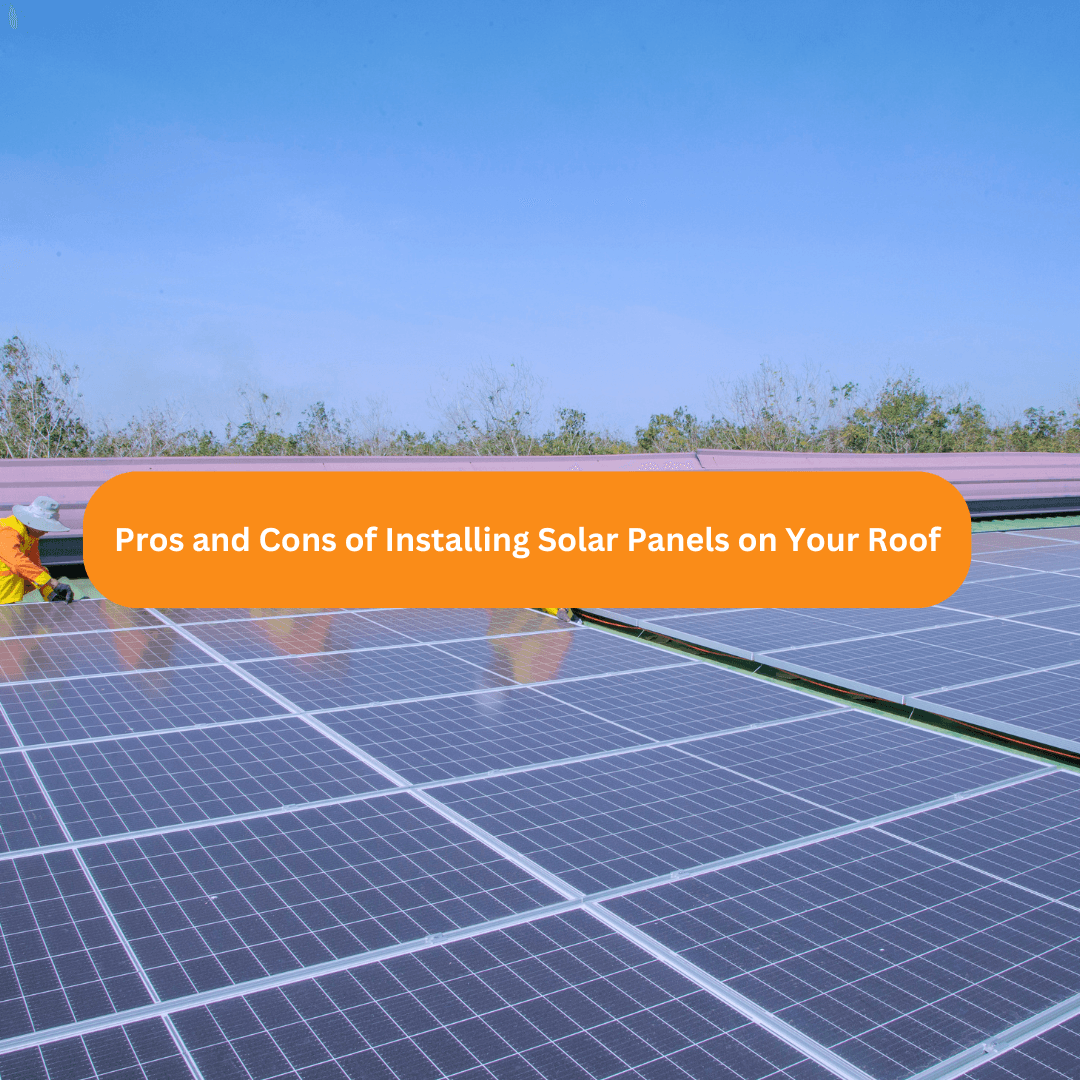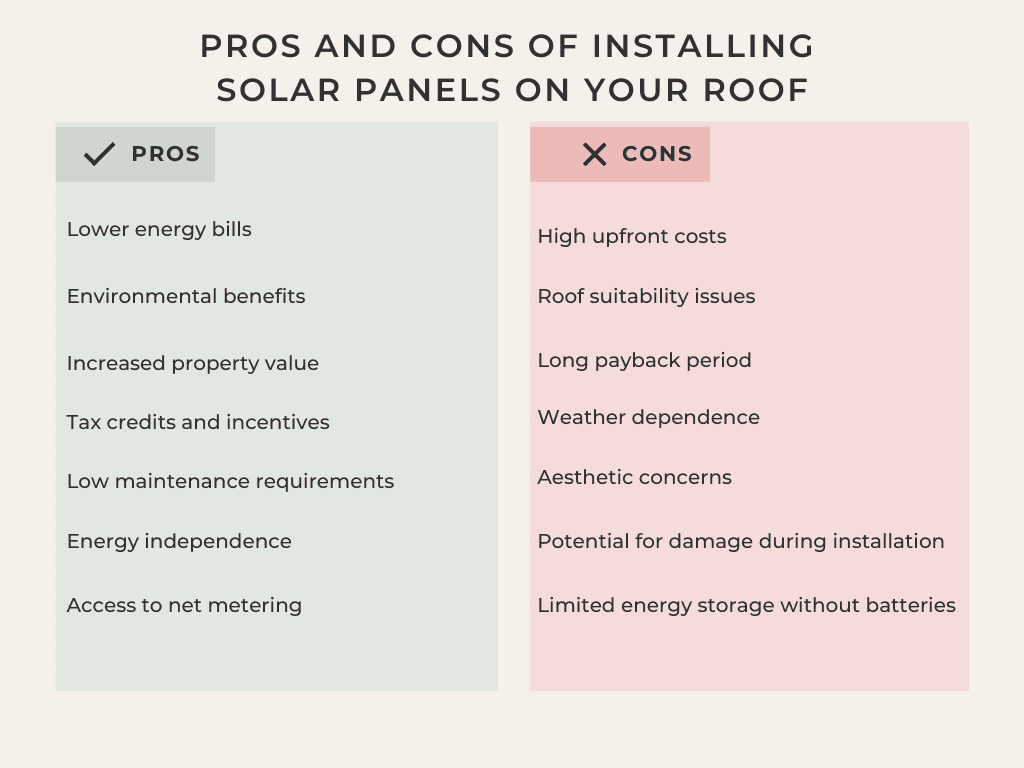Pros and Cons of Installing Solar Panels on Your Roof
Oct 24, 2024

Much attention has been taken about solar energy as an alternative energy source for homeowners to cut their environmental footprint and electricity bill. However, the onus of whether you should install solar panels on your roof or not calls for a careful analysis of the pros and cons of installation.
The following is a comprehensive discussion on whether installing solar panels on your roof has lots of benefits for you to start enjoying the advantages of saving the environment and cutting your electricity bill.

Pros of Installing Solar Panels on the Roof
Lower Energy Bills
One of the advantages of solar panel installation is also immediately and seemingly tangible: saving more money on energy. The solar panels help tap solar energy into producing electricity, thus freeing you from dependency on the grid. This could significantly reduce your utility costs for the month, especially for those who stay in sunny areas the whole year round. Savings in the case of most, if not all, household needs can be witnessed after saving for a great period. The amount of money saved goes hand-in-hand with how much energy has been used and the size of the system, but very often, the savings created make solar energy an attractive investment.
Environmental Benefits
Solar energy is arguably one of the cleanest and most renewable forms of power that exists. Unlike fossil fuels, solar energy does not produce pollutants or greenhouse gases in the atmosphere in the course of fulfilling its tasks. This makes this form of energy reduce the overall carbon footprint of a household. Installation of solar panels can help in the fight against climate change and can bring a cleaner environment for future generations. Besides saving water, it also reduces the pollutant, as the use of solar energy involves much less water than any conventional source of energy, like coal or nuclear power.
Increased Property Value
Homes with installed solar panels increase property values. More and more homes that have been equipped with solar panels sell faster and at a higher price than those without. Buyers are increasingly aware of the potential for long-term savings through these energy-efficient homes. The solar panels are considered a capital asset, further increasing the long-term value of the property. They can also be a major selling point in a competitive real estate market to environmentally conscious buyers, making it more appealing.
Tax Credits and Incentives
Many countries and local governments offer financial incentives to homeowners for using solar panels. In the United States, for example, there is the federal solar tax credit that enables a homeowner to deduct an amount equivalent to nearly half of the cost of a solar system from his or her taxes. Most states and municipalities offer rebates or other incentives to encourage the usage of solar systems. These incentives reduce the overall installation cost profoundly and hence make solar energy more affordable to a homeowner generally. Indeed, some forms of leasing and PPA-based option enables homeowners to avail lower monthly payments that reflect these tax credits and incentives.
Low Maintenance Requirements
Even after they are put in, solar panels have very little maintenance to do. Most solar systems work well with minimal intervention for 20 to 30 years. Cleaning and checks every now and then are usually enough to keep them performing at their best. Also, most of the providers offer warranties that ensure problems with panel degradation or equipment failure are covered. This makes solar panels an attractive option for homeowners who would like to reap the advantages of renewable energy without burdening themselves with heavy maintenance. Also, solar systems are designed to be resilient to adverse weather conditions, thereby making them normally durable and reliable as well.
Energy Independence
Solar power also provides a choice for homeowners to be less dependent on utility providers and on the sometimes fluctuating cost of electricity. Homeowners will then, for the most part, enjoy their own means of generating their own electricity, thereby achieving an energy independence that helps protect them from rising energy prices as well as potential power outages. This autonomy can be of especial value in areas where grid reliability is a concern since a solar system-especially one paired with battery storage-can guarantee a consistent power supply. For those with a particular interest in energy security, solar panels provide an avenue towards reducing one's vulnerability towards blacks and energy shortages.
Access to Net Metering
It is known by the name of net metering, a policy that allows homeowners to get credited if the solar panels above their rooftops are producing more electricity than what is consumed in the house. In simple words, when your solar system produces more electricity than you need for your house, it sends back the extra energy to the grid, and it gets credited in your account with your utility company. This can make the bills become nil or even negative for some months, which can again be increased more in financial benefits with solar panels. Another reason the solar panel may be a good investment is that it can "bank" excess energy for later use which would then make it an excellent option for those who consider saving as much as is possible in energy consumption.
Cons of Installing Solar Panels on the Roof
High Upfront Costs
One of the biggest barriers to installing solar panels is their high up-front expense. A full solar panel system with installation can cost tens of thousands of dollars, though many tax credits and incentives help offset those costs. Still, that is a burden for many homeowners. Some potential customers cannot afford the capital to buy a system outright, though loans or leases can alleviate that problem. The cost barrier alone still might discourage some of those buyers from seeking solar energy.
Roof Suitability
Not all roofs will be appropriate for installing solar panels. Several factors can dictate the feasibility of solar panels on a roof, such as the age, condition, and orientation of the roof. Shadows created by shade trees or other obstructions on other buildings in the area will deprive direct sunlight from reaching the solar panels. Ensuring that the roof is sound and suitably angled towards generating enough sunlight also maximizes the amount that comes out of the system.
Long Payback Period
Though saving extra electricity bills from solar panels, the long payback period-time to recoup the investment-can be lengthy. Payback periods vary, taking into account any wide variations: local energy rates, sunlight exposure, and system cost, which may require 7 to 20 years. In general, solar panels often stand for a considerable long-run saving, but homeowners looking for quicker returns on an investment may be discouraged due to the long payback period.
Weather Dependence
As the solar panels need sunlight to generate electricity, they rely on sun for their efficiency. Such days with complete clouds or storms and periods that prolong unduly may also lead to a lesser production of electricity. Areas with very low sunlight or whose weather badly varies might not be able to generate enough power to provide constant electricity to the house. Although solar systems may keep on operating even if there is cloudiness, their efficiency is mostly reduced, hence helping to cap potential savings.
Aesthetic Concerns
Visual Impact: Some people do not like the appearance of solar panels on their homes. Classic solar panels are relatively large, and with rooftops, it can dominate a house, especially when that house is significantly smaller. Even modern panels are sleeker, but possibly deemed an eyesore by others. Some homeowners may be restricted or not be approved by local aesthetic standards or even a homeowner association to install solar panels.
Potential for Damage During Installation
Installation of solar panels has to be done in such a way that panels are attached directly to the rooftop, and improper installation may pose some slight drawbacks by bringing damage to the roof. Leakage or compromising of the structural integrity of the roof happens to be one of the common risks of improper installation. It could also be added that once the panels have been installed, any repairs or replacements to the roof become more complicated and costlier. The best advice here is to work with experienced, certified installers in order to avoid these issues, but always damage is possible.
Limited Energy Storage
If not combined with a battery storage system, solar panels can only generate electricity when the sun is shining during the daytime. In the evening or when the sun is not shining appropriately, households would have to depend on grid electricity, which makes all the efforts put into go solar partial benefits. With a battery storage system, however, this challenge can be broken; however, batteries are very costly, and the overall cost of the solar installation would be hugely impacted. Without storage, the household cannot realize 100 percent of the energy created by its solar panels.
Conclusion
While installing solar panels on your roof will provide you with reduced energy bills, environmental sustainability, increased property value, among numerous other advantages, there are definitely potential drawbacks to be considered. Among the most important drawbacks include that of high upfront investment, long payback period, and dependency on the weather. The decision to harness solar power should be well-informed, taking into account unique circumstances specific to an individual, such as the state of the roof, the climate of the region, or any form of financial incentives already in place. To many homeowners, solar panels will be a long-term investment that will pay itself off financially as well as environmentally; to others, however, the cons will outweigh the pros.
